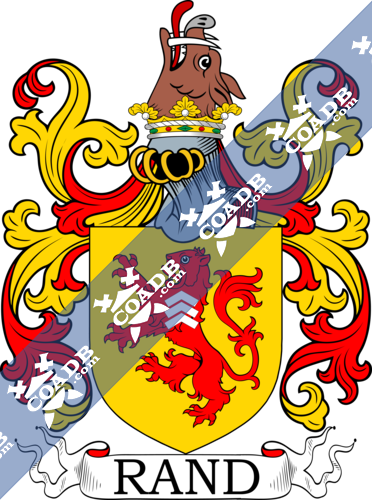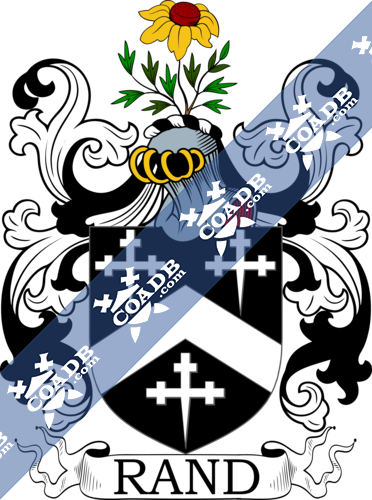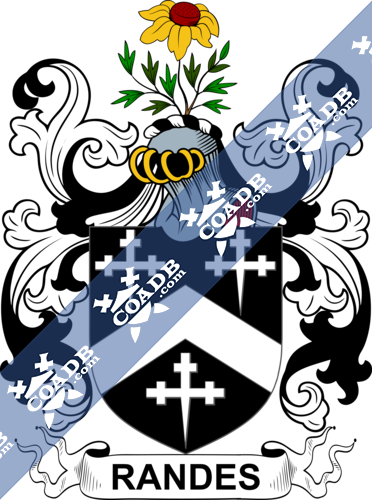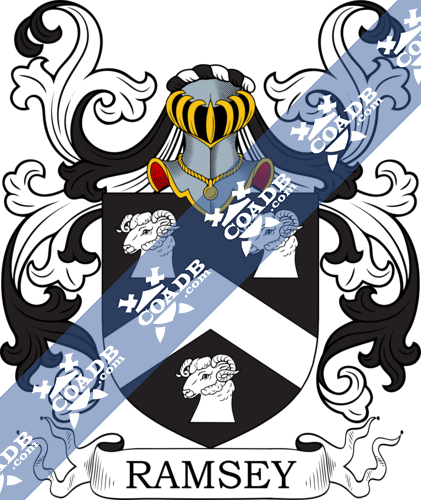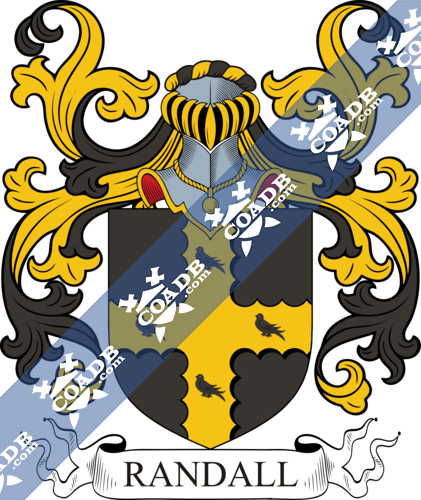Rand Family Crest, Coat of Arms and Name History
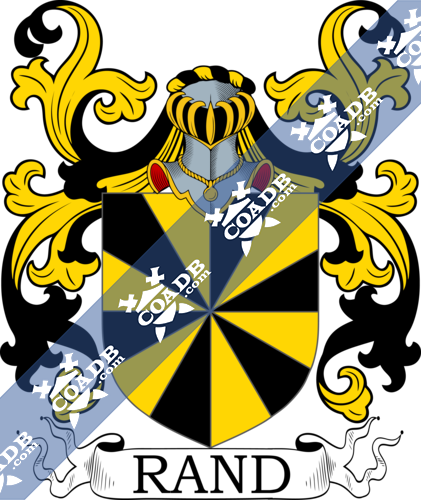
Rand Coat of Arms Gallery
Don’t know which Coat of Arms is yours?
We can do a genealogical research. Find out the exact history of your family!
Learn MoreRAND
Rand is a surname found throughout western Europe. It is thought to have two sources of origin, the first states it is a shortened form of the Germanic male given Randolph, a compound word with the prefix of “rand” which translates to rim like in that of a shield. In this context, the name would be patronymic. The second source would be habitational as the name would have applied to someone who lived near or on the bank or “rand” of a river.
Surnames had various sources of origins. Some people may have been identified by their given name plus their occupation while others may have been identified by their given name and one of their parent’s names. There was an endless supply from which surnames were culled, in addition to the use of patriarchal/matriarchal names or reference to the individuals occupation, there were things such as defining physical traits, a familiar geographical location or a topographical landmark found near the individuals home or birthplace, the name of the village in which the person lived, and much more. Soon, surnames would come not just to represent an individual but whole families.
The use of surnames was not a common practice in Europe, except among the noble classes, until the mid-sixteenth century. The popularity in the use of surnames developed out of necessity, clarity, and practicality. As populations in European cities grew, it became necessary for clarity’s sake to add a qualifier to a person’s given name to distinguish them from another who may share the same common name. For practical purposes, governments found the use of surnames made the recording and tracking of people for census, taxation, and immigration purposes easier, as well.
The task of record keeping was primarily the responsibility of the churches, priories, and government as literacy was often a skill found only among the wealthy, the clergy, and those in government. Even so, there often existed multiple variations of names which was attributed to a number of factors; the origins of the surname, the lack of guidelines which existed for spelling, and the
fact that many scribes and clergy members who were charged with record keeping spelled phonetically, among other things. Some of the early variations of this surname include; Rand; Rande; Raynde; Rynd; Raynd; and Rynde, among others.
The earliest record of any variation of this surname is that of Herlewinus de Rande which appears in the North Hampton tax rolls from 1176. These rolls, were a series of census and tax records kept by the English Treasury by order of King Henry II, with the oldest dating back seven hundred years to the 12th century. They hold the distinction of being the oldest consecutive set of records detailing English governance in the United Kingdom.
With the discovery of America and other countries added to the lands of the British Commonwealth, it was not long before people began immigrating to these outlying areas. Some of the first recorded immigrants to America bearing the surname were James Rand who arrived in 1623 and settled in Plymouth, Massachusetts. Francis Rand arrived in 1630 and settled in New Hampshire. Robert Rand arrived in 1649 and settled in Lynn, Massachusetts.
Worldwide, the highest concentration of people with the surname Rand are found in the United States, the United Kingdom, Australia, Denmark, and Norway. By state, the largest percentile of those with the surname Rand live in Maine, New Hampshire, Massachusetts, Connecticut, New Mexico, and Nevada.
There are many persons of note who bear the surname such as American born muralist and painter, Archie Rand. His work is displayed around the world including collections found in the Tel Aviv Museum of Art, Victoria and Albert Museum, the bibliotheque Nationale de France, and the Art Institute of Chicago. His works can also be found in many private collects as well such as; the Metropolitan Museum of Art, the Whitney Museum, the Art Institute of Chicago, the Smithsonian, The New York Public Library, Harvard, Yale, Columbia, Brown, and John Hopkins Universities.
British born William Rand was a physician. He was a pioneer in general reforms in medical education, practice, and publications. Rand was educated at Cambridge and the University of Leiden.
It is also interesting to note, the surname’s earliest meaning of someone living near or on a beach alongside a river is also found in the origins of the Boer/South African currency originally called the Witwatersrand, which means “White Waters Edge.” An allusion to the rocky shores of South Africa’s coastline. The currency is now simply referred to as the “Rand.”
Blazons & Genealogy Notes
1) (Vicar of Norton 1578, Prebendary of Durham 1606, of Gateshead, co. Durham, and of London). Or, a lion ramp. gu. charged on the shoulder with three chev. ar. Crest—Out of a coronet a boar’a head in pale.
2) Sa. a chev. betw. three crosses crosslet fitchée ar. Crest—A marigold stalked and leaved ppr.
3) Gyronny of twelve or and sa.

